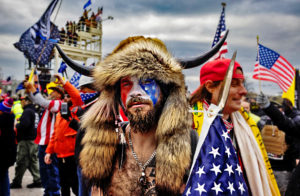Thursday 22 May 1856, was a sunny, sleepy day in Washington, D.C. As Preston Brooks, the Democratic Representative from South Carolina’s Fourth District, strolled into the Senate chamber, the air felt hot and heavy. The Senate’s business had wound down; the galleries had almost emptied. Brooks glanced up, and waited for the last spectators to leave. It was important, he thought, that no ladies were present to watch what he had planned.
When he was satisfied, Brooks walked over to the desk of Massachusetts’s Republican senator Charles Sumner, who was busy writing and barely even looked up. Between the two men there was no love lost. Brooks, who walked with a cane after having being injured in a youthful duel, was a passionate defender of slavery. Sumner, by contrast, was one of the nation’s most outspoken abolitionists. Only days earlier he had delivered a blistering speech mocking Brooks’s cousin, Senator Andrew Butler, as a hapless Don Quixote-style knight devoted to “the harlot, Slavery”.
To Brooks, the speech seemed an intolerable affront. At first he had considered challenging Sumner to a duel, but decided against it on the grounds that the Massachusetts politician was no gentleman. But he remained determined to take his revenge. And now, as Sumner glanced dismissively up, Brooks spoke. “Mr Sumner, I have read your speech twice over carefully,” he said quietly. “It is a libel on South Carolina, and Mr Butler, who is a relative of mine.”
At that, Sumner tried to rise, but Brooks was too quick for him. He lifted his thick gutta-percha cane, with its heavy golden top, and brought it savagely down on Sumner’s head, again and again. Sumner fell. Blood trickled down his face. He was trapped behind his desk; he could not get up. Still the blows rained down, Brooks lashing away like a man possessed. Sumner was unconscious now. At last, some of Brooks’s colleagues managed to pull him off. A pool of blood spread across the floor of the Senate.
Although Charles Sumner didn’t die that afternoon, the sheer violence of the assault struck many Americans, even at the time, as a terrible harbinger of the horror ahead. But while thousands of anti-slavery Northerners joined rallies in Sumner’s support, the reaction in the South was very different.
Ordinary people sent Brooks hundreds of new canes to replace his own shattered weapon; one was inscribed “Hit him again”. Many Southern politicians insisted that Sumner had exaggerated his injuries, dismissing the fake news of the abolitionist media. And on the fire-breathing wing of the Southern press, there was no doubt about who was really in the wrong. Brooks’s attack was “good in conception, better in execution, and best of all in consequences”, declared the Richmond Enquirer. Ideally, it said, the “vulgar abolitionists in the Senate” should be “lashed into submission”.
Today, historians see the Brooks-Sumner confrontation as a milestone on the United States’ road to the Civil War, encapsulating the collapse of civility, the triumph of tribalism and the disappearance of the political middle ground. I’ve been thinking about it a lot over the past couple of years. And I thought about it again this week amid the frenzied reaction to the FBI’s raid on Donald Trump’s home in Mar-a-Lago, Florida, where he is alleged to have taken — and even tried to destroy — confidential government documents.
Put aside, if you can, your own views about the rights and wrongs of the FBI raid. Perhaps it really is a sign of the overreach of the deep state, determined to smear and undermine a decent American patriot. Or perhaps it’s a welcome reminder that nobody, not even a former president, is above the law. Perhaps you think Donald Trump isn’t the kind of man who would trample roughshod over rules and conventions; perhaps you simply can’t imagine him making off with classified records and trying to flush them down the toilet. Or perhaps you think he is — and you can.
But this isn’t really the issue. Does anybody really see the fate of Donald Trump’s paperwork as the most pressing challenge facing the American republic? The more interesting question — as with the caning of Charles Sumner in 1856 — is what the whole imbroglio tells us about the health, or otherwise, of American politics.
As soon as news of the FBI raid broke, Republicans almost unanimously rushed to denounce the agency’s abuse of power, and to defend the former president as the victim of a witch-hunt. Would they, I wonder, have said the same thing if, say, the FBI had raided Hillary Clinton’s house in search of her controversial private emails? I doubt it, somehow.
And it works the other way around, too. The same Democrats glorying in Mr Trump’s embarrassment today would have been appalled if the FBI had applied the same tactics to Mrs Clinton yesterday. You don’t hear many liberal Democrats wondering if the FBI was a bit heavy-handed, just as you don’t find many conservative Republicans insisting that nobody must be above the law. And you didn’t find many pro-slavery Southerners in 1856 rushing to condemn Preston Brooks. In the 2020s, as in the 1850s, the tribalism is total, and partisanship is all.
To get a sense of what today’s successors to those antebellum Southern editorialists are thinking, I turned to Fox News. First up was the conservative classical historian Victor Davis Hanson. “Biden Administration is Using Soviet-Style Tactics to Crush its Political Opponents” read the banner at the bottom of the screen. Hanson was in no doubt: the FBI raid was a plot by the Democrats running the “national security state”. “They believe they’re morally superior to America and therefore any means [are] necessary or justifiable for their morally superior ends,” he said grimly. “Right now, we don’t have the rule of law in Washington.”
That, I thought, is a pretty bleak thing to say about your own government. An odd thing, too, since the director of the FBI, Christopher Wray, is an avowed, card-carrying Republican. I had a quick look at his biography. It turns it out he went to the same New York private school as Donald Trump, Jr., then the same Massachusetts boarding school, Phillips Academy, as the two Bush presidents. He served in George W. Bush’s administration and was appointed to run the FBI by… Donald Trump himself!
I suppose it’s just plausible that Wray has been playing a very long game, and has been a radical leftist all along. Or it’s possible that despite his long Republican service, he’s a man of such careerist self-interest and deep moral spinelessness that in the last two years he’s allowed himself to become a puppet for the sick neo-Stalinists running the Biden Administration. Possible, but not terribly probable.
Anyway, back I went to Fox News. Maybe the conservative talk show host Greg Gutfeld would add a bit of perspective, or at least lighten the mood? Not a bit of it. The FBI raid had been cold-bloodedly planned, Gutfeld said, to provoke Mr Trump’s supporters, inciting them into “another January 6th”. They — the deep state — “want an excuse to track down more Republicans and people in red hats… Walls are closing in. Tick, tick, tick. Boom. This is it.”
Once again, dark territory. You could easily forget that at the heart of all this is basically an argument about some paperwork. But of course the paperwork isn’t the point; the point is the existential, apocalyptic, all-or-nothing conflict between right and wrong, good and evil, blue and red — which, as we are always being told, is a “struggle for the soul of America”.
Another Fox host, Will Cain, put it very starkly. “A day after the FBI’s raid on former president Donald Trump,” he told his viewers, “we are starting to see what a permanent national split looks like. A divorce. Nobody wants to say it out loud, but it’s true. And this is not simply a break between Democrats and Republicans. No, that’s too simple. What we are seeing is a divide between people who are willing to use the power of the state to silence their opponent and those who are unwilling.”
Put aside the exaggeration of that final sentence, and is he wrong? There are tens of millions of Americans who don’t follow politics closely, don’t spend their time shouting at their opponents on social media and certainly don’t see themselves as foot-soldiers in some future civil war. But in many ways the reaction to the FBI raid feels like precisely the kind of thing you’d see in the early chapter of some book subtitled “How the Second Civil War Began”. The partisanship. The distrust. The belief that your adversaries are part of a giant, malevolent conspiracy. The dismissal of facts that don’t fit. And above all, the sense, as in the late 1850s, that the stakes just could not be higher. “Walls are closing in. Tick, tick, tick. Boom…”
Is talk of a new civil war so ludicrous? The Oxford history professor Adam Smith, one of the shrewdest observers of American politics I know, recently sketched out a scenario for the Sunday Times, suggesting that “red America and blue America would become increasingly antagonistic entities, competing for the allegiance of a clutch of divided ‘purple’ states.” In this scenario, he writes, “it is easy to imagine that with the Republican majority on the Supreme Court baked in for decades, and an electoral system that gives an advantage to rural Republican states, the big Democratic states such as California and New York will push for more and more autonomy.” And if the federal government pushed back, who knows what might happen?
Even at a grassroots level, you can see signs of trouble. Writing for UnHerd in January, the essayist James Pogue reported that in his rural northern California county, “there is a very totalising war of worldviews, touched off by the pandemic and resistance to expert advice and state action, led by a militia-aligned faction that thinks the local government betrayed the county’s free-living values by participating in California’s Covid protocols”. There haven’t, Pogue noted, “been any bombings or shootings, but there have been fights, and much of the local police force is more or less openly sympathetic to the radical faction. The Right in the county is now almost entirely alienated from the other structures of government, and it is hard to see how this situation could change.”
Too bleak? Perhaps. When I visited America before Easter, it didn’t feel like a country on the brink. The sun shone. The shops were busy. People wandered happily about, as friendly and hospitable as ever. In two weeks, I didn’t hear a single remark about politics. Nor did I see a single MAGA hat, or a Trump T-shirt — and this in Florida.
But I would probably have said similar things in the summer of 1856, too. The sun often shines, before the storm.
Disclaimer
Some of the posts we share are controversial and we do not necessarily agree with them in the whole extend. Sometimes we agree with the content or part of it but we do not agree with the narration or language. Nevertheless we find them somehow interesting, valuable and/or informative or we share them, because we strongly believe in freedom of speech, free press and journalism. We strongly encourage you to have a critical approach to all the content, do your own research and analysis to build your own opinion.
We would be glad to have your feedback.
Source: UnHerd Read the original article here: https://unherd.com/






